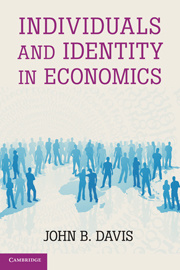Description
Individuals and Identity in Economics
Author: Davis John B.
This book looks at conceptions of the individual in recent new approaches in economics.
Language: English
Subject for Individuals and Identity in Economics:
Approximative price 38.06 €
In Print (Delivery period: 14 days).
Add to cart
Individuals and Identity in Economics
Publication date: 09-2010
270 p. · 15.4x22.8 cm · Paperback
Publication date: 09-2010
270 p. · 15.4x22.8 cm · Paperback
Approximative price 84.66 €
In Print (Delivery period: 14 days).
Add to cart
Individuals and Identity in Economics
Publication date: 10-2010
270 p. · 15.4x23.4 cm · Hardback
Publication date: 10-2010
270 p. · 15.4x23.4 cm · Hardback
Description
/li>Contents
/li>Biography
/li>
This book examines the different conceptions of the individual that have emerged in recent new approaches in economics, including behavioral economics, experimental economics, social preferences approaches, game theory, neuroeconomics, evolutionary and complexity economics, and the capability approach. These conceptions are classified according to whether they seek to revise the traditional atomist individual conception, put new emphasis on interaction and relations between individuals, account for individuals as evolving and self-organizing, and explain individuals in terms of capabilities. The method of analysis uses two identity criteria for distinguishing and re-identifying individuals to determine whether these different individual conceptions successfully identify individuals. Successful individual conceptions account for sub-personal and supra-personal bounds on single individual explanations. The former concerns the fragmentation of individuals into multiple selves; the latter concerns the dissolution of individuals into the social. The book develops an understanding of bounded individuality, seen as central to the defense of human rights.
1. Introduction: the individual in economics; Part I. Atomism Revised: 2. Psychology's challenge to economics: rationality and the individual; 3. Multiple selves and self-control: contextualizing individuality; 4. Social identity and social preferences in the utility function; Part II. Interaction: 5. The individual in game theory: from fixed points to experiments; 6. Multiple selves in interaction: teams and neuroscience; 7. Evolutionary conceptions of the individual: identity through change; Part III. Socially Embedded Individuals: 8. Evolution and capabilities: human heterogeneity; 9. The identity of individuals and the economics of identity; 10. Economic policy, democracy, and justice.
John B. Davis is Professor and Chair of History and Philosophy of Economics at the University of Amsterdam; Professor of Economics at Marquette University, Milwaukee, Wisconsin; and Fellow at the Tinbergen Institute, Erasmus University, Rotterdam. He is the author of Keynes's Philosophical Development (Cambridge University Press, 1994) and The Theory of the Individual in Economics (2003), which was a co-winner of the 2004 Myrdal Prize from the European Association for Evolutionary Political Economy. He is a co-editor with Wade Hands and Uskali Mäki of The Handbook of Economic Methodology (1998) and a co-editor with Warren Samuels and Jeff Biddle of The Blackwell Companion to the History of Economic Thought (2003). Professor Davis has published in journals such as the Cambridge Journal of Economics, the Economic Journal, the Review of Political Economy, the History of Political Economy and the Journal of Economic Methodology. Professor Davis is a past President of the History of Economics Society, a past Chair of the International Network for Economic Method and past President of the Association for Social Economics. He is a past editor of the Review of Social Economy and is currently co-editor with Wade Hands of the Journal of Economic Methodology.
© 2024 LAVOISIER S.A.S.




